- Home
- E. M. Forster
A Passage to India Page 6
A Passage to India Read online
Page 6
It would have been simpler to tell Dr. Lal that he had changed his mind about the party, but until the last minute he did not know that he had changed it; indeed, he didn’t change it, it changed itself. Unconquerable aversion welled. Mrs. Callendar, Mrs. Lesley—no, he couldn’t stand them in his sorrow: they would guess it—for he dowered the British matron with strange insight—and would delight in torturing him, they would mock him to their husbands. When he should have been ready, he stood at the Post Office, writing a telegram to his children, and found on his return that Dr. Lal had called for him, and gone on. Well, let him go on, as befitted the coarseness of his nature. For his own part, he would commune with the dead.
And unlocking a drawer, he took out his wife’s photograph. He gazed at it, and tears spouted from his eyes. He thought, “How unhappy I am!” But because he really was unhappy, another emotion soon mingled with his self-pity: he desired to remember his wife and could not. Why could he remember people whom he did not love? They were always so vivid to him, whereas the more he looked at this photograph, the less he saw. She had eluded him thus, ever since they had carried her to her tomb. He had known that she would pass from his hands and eyes, but had thought she could live in his mind, not realizing that the very fact that we have loved the dead increases their unreality, and that the more passionately we invoke them the further they recede. A piece of brown cardboard and three children—that was all that was left of his wife. It was unbearable, and he thought again, “How unhappy I am!” and became happier. He had breathed for an instant the mortal air that surrounds Orientals and all men, and he drew back from it with a gasp, for he was young. “Never, never shall I get over this,” he told himself. “Most certainly my career is a failure, and my sons will be badly brought up.” Since it was certain, he strove to avert it, and looked at some notes he had made on a case at the hospital. Perhaps some day a rich person might require this particular operation, and he gain a large sum. The notes interesting him on their own account, he locked the photograph up again. Its moment was over, and he did not think about his wife any more.
After tea his spirits improved, and he went round to see Hamidullah. Hamidullah had gone to the party, but his pony had not, so Aziz borrowed it, also his friend’s riding breeches and polo mallet. He repaired to the Maidan. It was deserted except at its rim, where some bazaar youths were training. Training for what? They would have found it hard to say, but the word had got into the air. Round they ran, weedy and knock-kneed—the local physique was wretched—with an expression on their faces not so much of determination as of a determination to be determined. “Maharajah, salaam,” he called for a joke. The youths stopped and laughed. He advised them not to exert themselves. They promised they would not, and ran on.
Riding into the middle, he began to knock the ball about. He could not play, but his pony could, and he set himself to learn, free from all human tension. He forgot the whole damned business of living as he scurried over the brown platter of the Maidan, with the evening wind on his forehead, and the encircling trees soothing his eyes. The ball shot away towards a stray subaltern who was also practising; he hit it back to Aziz and called, “Send it along again.”
“All right.”
The new-comer had some notion of what to do, but his horse had none, and forces were equal. Concentrated on the ball, they somehow became fond of one another, and smiled when they drew rein to rest. Aziz liked soldiers—they either accepted you or swore at you, which was preferable to the civilian’s hauteur—and the subaltern liked anyone who could ride.
“Often play?” he asked.
“Never.”
“Let’s have another chukker.”
As he hit, his horse bucked and off he went, cried, “Oh God!” and jumped on again. “Don’t you ever fall off?”
“Plenty.”
“Not you.”
They reined up again, the fire of good fellowship in their eyes. But it cooled with their bodies, for athletics can only raise a temporary glow. Nationality was returning, but before it could exert its poison they parted, saluting each other. “If only they were all like that,” each thought.
Now it was sunset. A few of his co-religionists had come to the Maidan, and were praying with their faces towards Mecca. A Brahminy Bull walked towards them, and Aziz, though disinclined to pray himself, did not see why they should be bothered with the clumsy and idolatrous animal. He gave it a tap with his polo mallet. As he did so, a voice from the road hailed him: it was Dr. Panna Lal, returning in high distress from the Collector’s party.
“Dr. Aziz, Dr. Aziz, where you been? I waited ten full minutes’ time at your house, then I went.”
“I am so awfully sorry—I was compelled to go to the Post Office.”
One of his own circle would have accepted this as meaning that he had changed his mind, an event too common to merit censure. But Dr. Lal, being of low extraction, was not sure whether an insult had not been intended, and he was further annoyed because Aziz had buffeted the Brahminy Bull. “Post Office? Do you not send your servants?” he said.
“I have so few—my scale is very small.”
“Your servant spoke to me. I saw your servant.”
“But, Dr. Lal, consider. How could I send my servant when you were coming: you come, we go, my house is left alone, my servant comes back perhaps, and all my portable property has been carried away by bad characters in the meantime. Would you have that? The cook is deaf—I can never count on my cook—and the boy is only a little boy. Never, never do I and Hassan leave the house at the same time together. It is my fixed rule.” He said all this and much more out of civility, to save Dr. Lals face. It was not offered as truth and should not have been criticized as such. But the other demolished it—an easy and ignoble task. “Even if this so, what prevents leaving a chit saying where you go?” and so on. Aziz detested ill breeding, and made his pony caper. “Farther away, or mine will start out of sympathy,” he wailed, revealing the true source of his irritation. “It has been so rough and wild this afternoon. It spoiled some most valuable blossoms in the club garden, and had to be dragged back by four men. English ladies and gentlemen looking on, and the Collector Sahib himself taking a note. But, Dr. Aziz, I’ll not take up your valuable time. This will not interest you, who have so many engagements and telegrams. I am just a poor old doctor who thought right to pay my respects when I was asked and where I was asked. Your absence, I may remark, drew commentaries.”
“They can damn well comment.”
“It is fine to be young. Damn well! Oh, very fine. Damn whom?”
“I go or not as I please.”
“Yet you promise me, and then fabricate this tale of a telegram. Go forward, Dapple.”
They went, and Aziz had a wild desire to make an enemy for life. He could do it so easily by galloping near them. He did it. Dapple bolted. He thundered back on to the Maidan. The glory of his play with the subaltern remained for a little, he galloped and swooped till he poured with sweat, and until he returned the pony to Hamidullah’s stable he felt the equal of any man. Once on his feet, he had creeping fears. Was he in bad odour with the powers that be? Had he offended the Collector by absenting himself? Dr. Panna Lal was a person of no importance, yet was it wise to have quarrelled even with him? The complexion of his mind turned from human to political. He thought no longer, “Can I get on with people?” but “Are they stronger than I?” breathing the prevalent miasma.
At his home a chit was awaiting him, bearing the Government stamp. It lay on his table like a high explosive, which at a touch might blow his flimsy bungalow to bits. He was going to be cashiered because he had not turned up at the party. When he opened the note, it proved to be quite different; an invitation from Mr. Fielding, the Principal of Government College, asking him to come to tea the day after to-morrow. His spirits revived with violence. They would have revived in any case, for he possessed a soul that could suffer but not stifle, and led a steady life beneath his mutability. But this in
vitation gave him particular joy, because Fielding had asked him to tea a month ago, and he had forgotten about it—never answered, never gone, just forgotten. And here came a second invitation, without a rebuke or even an allusion to his slip. Here was true courtesy—the civil deed that shows the good heart—and snatching up his pen he wrote an affectionate reply, and hurried back for news to Hamidullah’s. For he had never met the Principal, and believed that the one serious gap in his life was going to be filled. He longed to know everything about the splendid fellow—his salary, preferences, antecedents, how best one might please him. But Hamidullah was still out, and Mahmoud Ali, who was in, would only make silly rude jokes about the party.
Chapter 7
THIS Mr. Fielding had been caught by India late. He was over forty when he entered that oddest portal, the Victoria Terminus at Bombay, and—having bribed a European ticket inspector—took his luggage into the compartment of his first tropical train. The journey remained in his mind as significant. Of his two carriage companions one was a youth, fresh to the East like himself, the other a seasoned Anglo-Indian of his own age. A gulf divided him from either; he had seen too many cities and men to be the first or to become the second. New impressions crowded on him, but they were not the orthodox new impressions; the past conditioned them, and so it was with his mistakes. To regard an Indian as if he were an Italian is not, for instance, a common error, nor perhaps a fatal one, and Fielding often attempted analogies between this peninsula and that other, smaller and more exquisitely shaped, that stretches into the classic waters of the Mediterranean.
His career, though scholastic, was varied, and had included going to the bad and repenting thereafter. By now he was a hard-bitten, good-tempered, intelligent fellow on the verge of middle age, with a belief in education. He did not mind whom he taught; public schoolboys, mental defectives and policemen, had all come his way, and he had no objection to adding Indians. Through the influence of friends, he was nominated Principal of the little college at Chandrapore, liked it, and assumed he was a success. He did succeed with his pupils, but the gulf between himself and his countrymen, which he had noticed in the train, widened distressingly. He could not at first see what was wrong. He was not unpatriotic, he always got on with Englishmen in England, all his best friends were English, so why was it not the same out here? Outwardly of the large shaggy type, with sprawling limbs and blue eyes, he appeared to inspire confidence until he spoke. Then something in his manner puzzled people and failed to allay the distrust which his profession naturally inspired. There needs must be this evil of brains in India, but woe to him through whom they are increased! The feeling grew that Mr. Fielding was a disruptive force, and rightly, for ideas are fatal to caste, and he used ideas by that most potent method—interchange. Neither a missionary nor a student, he was happiest in the give-and-take of a private conversation. The world, he believed, is a globe of men who are trying to reach one another and can best do so by the help of good will plus culture and intelligence—a creed ill suited to Chandrapore, but he had come out too late to lose it. He had no racial feeling—not because he was superior to his brother civilians, but because he had matured in a different atmosphere, where the herd-instinct does not flourish. The remark that did him most harm at the club was a silly aside to the effect that the so-called white races are really pinko-grey. He only said this to be cheery, he did not realize that “white” has no more to do with a colour than “God save the King” with a god, and that it is the height of impropriety to consider what it does connote. The pinko-grey male whom he addressed was subtly scandalized; his sense of insecurity was awoken, and he communicated it to the rest of the herd.
Still, the men tolerated him for the sake of his good heart and strong body; it was their wives who decided that he was not a sahib really. They disliked him. He took no notice of them, and this, which would have passed without comment in feminist England, did him harm in a community where the male is expected to be lively and helpful. Mr. Fielding never advised one about dogs or horses, or dined, or paid his midday calls, or decorated trees for one’s children at Christmas, and though he came to the club, it was only to get his tennis or billiards, and to go. This was true. He had discovered that it is possible to keep in with Indians and Englishmen, but that he who would also keep in with Englishwomen must drop the Indians. The two wouldn’t combine. Useless to blame either party, useless to blame them for blaming one another. It just was so, and one had to choose. Most Englishmen preferred their own kinswomen, who, coming out in increasing numbers, made life on the home pattern yearly more possible. He had found it convenient and pleasant to associate with Indians and he must pay the price. As a rule no Englishwoman entered the College except for official functions, and if he invited Mrs. Moore and Miss Quested to tea, it was because they were new-comers who would view everything with an equal if superficial eye, and would not turn on a special voice when speaking to his other guests.
The College itself had been slapped down by the Public Works Department, but its grounds included an ancient garden and a garden-house, and here he lived for much of the year. He was dressing after a bath when Dr. Aziz was announced. Lifting up his voice, he shouted from the bedroom, “Please make yourself at home.” The remark was unpremeditated, like most of his actions; it was what he felt inclined to say.
To Aziz it had a very definite meaning. “May I really, Mr. Fielding? It’s very good of you,” he called back; “I like unconventional behaviour so extremely.” His spirits flared up, he glanced round the living-room. Some luxury in it, but no order—nothing to intimidate poor Indians. It was also a very beautiful room, opening into the garden through three high arches of wood. “The fact is I have long wanted to meet you,” he continued. “I have heard so much about your warm heart from the Nawab Bahadur. But where is one to meet in a wretched hole like Chandrapore?” He came close up to the door. “When I was greener here, I’ll tell you what. I used to wish you to fall ill so that we could meet that way.” They laughed, and encouraged by his success he began to improvise. “I said to myself, How does Mr. Fielding look this morning? Perhaps pale. And the Civil Surgeon is pale too, he will not be able to attend upon him when the shivering commences. I should have been sent for instead. Then we would have had jolly talks, for you are a celebrated student of Persian poetry.”
“You know me by sight, then.”
“Of course, of course. You know me?”
“I know you very well by name.”
“I have been here such a short time, and always in the bazaar. No wonder you have never seen me, and I wonder you know my name. I say, Mr. Fielding?”
“Yes?”
“Guess what I look like before you come out. That will be a kind of game.”
“You’re five feet nine inches high,” said Fielding, surmising this much through the ground glass of the bedroom door.
“Jolly good. What next? Have I not a venerable white beard?”
“Blast!”
“Anything wrong?”
“I’ve stamped on my last collar stud.”
“Take mine, take mine.”
“Have you a spare one?”
“Yes, yes, one minute.”
“Not if you’re wearing it yourself.”
“No, no, one in my pocket.” Stepping aside, so that his outline might vanish, he wrenched off his collar, and pulled out of his shirt the back stud, a gold stud, which was part of a set that his brother-inlaw had brought him from Europe. “Here it is,” he cried.
“Come in with it if you don’t mind the unconventionality.”
“One minute again.” Replacing his collar, he prayed that it would not spring up at the back during tea. Fielding’s bearer, who was helping him to dress, opened the door for him.
“Many thanks.” They shook hands smiling. He began to look round, as he would have with any old friend. Fielding was not surprised at the rapidity of their intimacy. With so emotional a people it was apt to come at once or never, and he and Aziz,
having heard only good of each other, could afford to dispense with preliminaries.
“But I always thought that Englishmen kept their rooms so tidy. It seems that this is not so. I need not be so ashamed.” He sat down gaily on the bed; then, forgetting himself entirely, drew up his legs and folded them under him. “Everything ranged coldly on shelves was what I thought—I say, Mr. Fielding, is the stud going to go in?”
“I hae ma doots.”
“What’s that last sentence, please? Will you teach me some new words and so improve my English?”
Fielding doubted whether “everything ranged coldly on shelves” could be improved. He was often struck with the liveliness with which the younger generation handled a foreign tongue. They altered the idiom, but they could say whatever they wanted to say quickly; there were none of the babuisms ascribed to them up at the club. But then the club moved slowly; it still declared that few Mohammedans and no Hindus would eat at an Englishman’s table, and that all Indian ladies were in impenetrable purdah. Individually it knew better; as a club it declined to change.
“Let me put in your stud. I see … the shirt back’s hole is rather small and to rip it wider a pity.”
“Why in hell does one wear collars at all?” grumbled Fielding as he bent his neck.
“We wear them to pass the Police.”
“What’s that?”

 The Celestial Omnibus and Other Stories
The Celestial Omnibus and Other Stories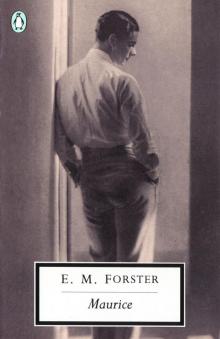 Maurice
Maurice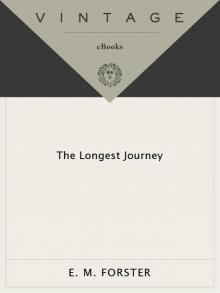 The Longest Journey
The Longest Journey Howards End
Howards End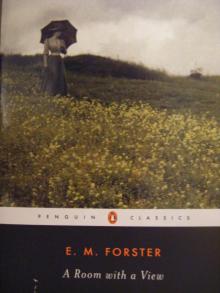 A Room with a View
A Room with a View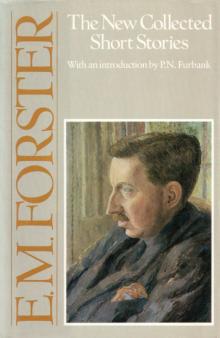 The New Collected Short Stories
The New Collected Short Stories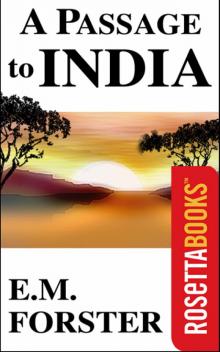 A Passage to India
A Passage to India Where Angels Fear to Tread
Where Angels Fear to Tread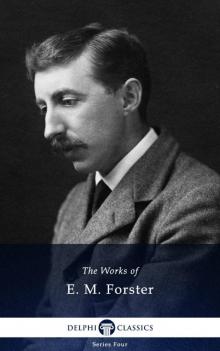 Works of E M Forster
Works of E M Forster Selected Stories
Selected Stories The Machine Stops
The Machine Stops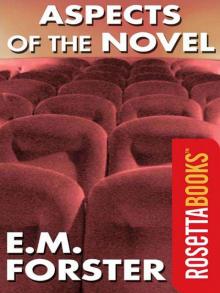 Aspects of the Novel
Aspects of the Novel